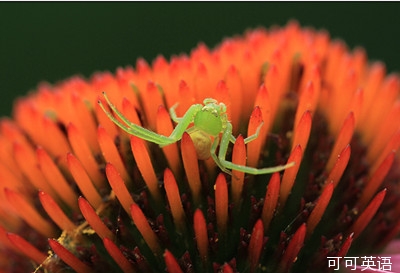The grasshopper is a carefree creature…according to Aesop's fables. But in real life, grasshoppers can have a lot to worry about.
根據(jù)伊索寓言,蚱蜢是無憂無慮的生物...但是在現(xiàn)實生活中,蚱蜢要擔(dān)心的東西太多了。
For example, grasshoppers get quite anxious when they know there's a deadly spider about, and it puts them off their food. Since their food is grass, nervous grasshoppers leave more grass intact to perform photosynthesis, turning sunlight and carbon dioxide into plant food. More CO2 in these grasses and their roots means less CO2 in the air. That's according to a new paper published in Proceedings of the National Academy of Sciences.
例如,當(dāng)蚱蜢知道附近有只致命的蜘蛛時就會變得異常煩躁,而且蜘蛛使它們遠(yuǎn)離了食物。因為蚱蜢以草為食,緊張的蚱蜢留下了更完整的葉子來進(jìn)行光合作用,即把陽光和二氧化碳轉(zhuǎn)化為植物的食物。草及其根部的二氧化碳越多,就意味著空氣中的二氧化碳更少。這項研究發(fā)表在最近的《國家科學(xué)院學(xué)報》上。

Yale researchers tracked CO2 as it cycled through Plexiglass cages containing just grass, grass and grasshoppers, or grass, grasshoppers and spiders. Grasses stored 1.4 times as much carbon with spiders about than when grasshoppers were allowed to roam unmolested. That's even better than when there were no grasshoppers at all because nervous grasshopper grazing did little damage but spurred greener growth.
耶魯研究人員追蹤了在樹脂玻璃籠子里循環(huán)的二氧化碳,樹脂玻璃籠子里分別裝有草,草和蚱蜢,或者草、蚱蜢和蜘蛛。當(dāng)蚱蜢能夠悠閑地漫游散步時,草內(nèi)儲存的二氧化碳比蜘蛛大約多1.4倍。當(dāng)根本沒有蚱蜢時情況會更好,因為雖然緊張的蚱蜢吃草對植物的傷害小了,但卻刺激了草的生長。
In other words, spiders protect the climate, just by being spiders and scaring grasshoppers.
換句話說,蜘蛛因為自己天生能嚇唬蚱蜢而保護(hù)了氣候。
Similar results may also prove true in ecosystems with larger predators, whether wolves and caribou or lions and zebras. Keeping predators around may be another way to combat climate change.
在生態(tài)系統(tǒng)中,無論是狼對馴鹿還是獅子對斑馬,同樣的結(jié)果也許也會發(fā)生在其他大型食肉動物身上。把捕食者圍起來也許是另一種與氣候變化對抗的方式。
原文譯文屬可可原創(chuàng),未經(jīng)允許請勿轉(zhuǎn)載!












